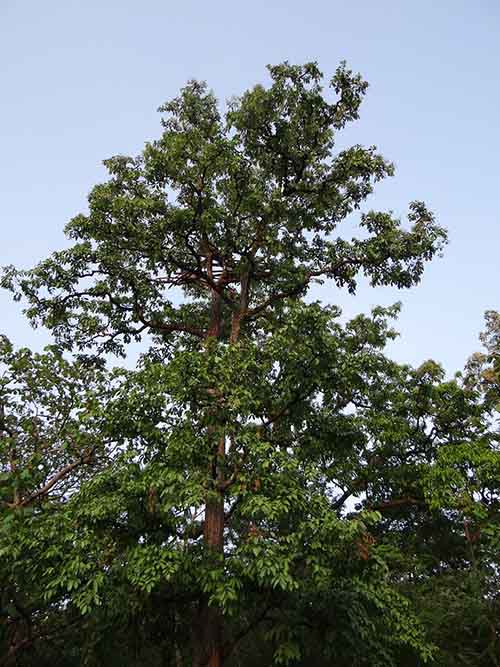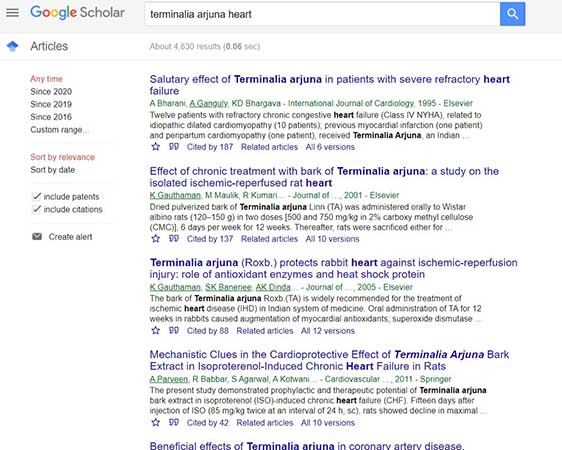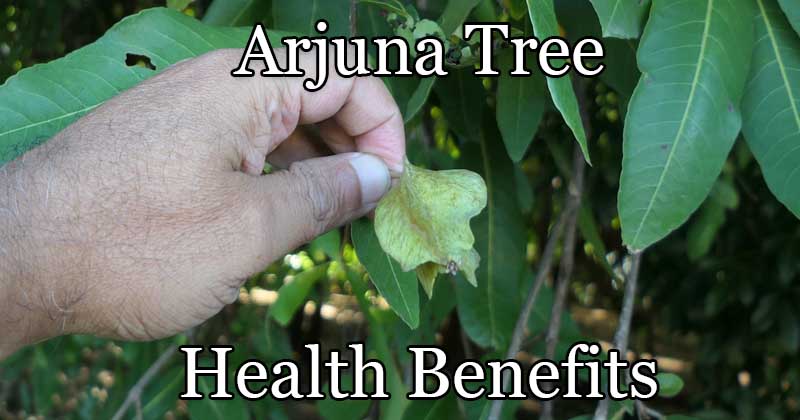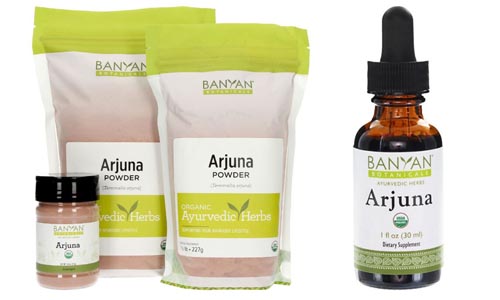If you walk around river beds in parts of India, you will probably see a tall, imposing tree with an yellow star-shaped fruit. This is the arjuna tree. To protect itself from infection and infestation, the arjuna tree evolved to have strong natural chemicals like antioxidants, enzymes and acids. These same components are what give arjuna herb health benefits to humans, particularly for heart health.
What is Terminalia Arjuna?

Terminalia arjuna, or arjuna tree, is a medicinal plant native to India which has been used as part of Ayurvedic medicine for hundreds of years. Arjuna is best known for its heart benefits and promising research shows arjuna has many other health benefits.
The plant is so important for Indian culture that the hero of the famous epic story Mahabharata; the hero is purportedly named after the terminalia tree. In addition to India, Arjuna tree grows in Sri Lanka, Bangladesh, Indonesia, and Malaysia. The plant is tropical and prefers humid, loose soil. (1).
Other Names for Terminalia Arjuna Tree
- Arjun tree
- Thella maddi (Telugu)
- Kumbuk (Sinhala)
- Marutha maram (Tamil)
- Neer maruthu (Malayalam)
- Hole Matthi (Kannada)
- Matthimara (Kannada)

Health Benefits of Arjuna
Arjuna tree isn’t just a major part of traditional Ayurvedic medicine: modern science has confirmed the many health benefits of arjuna tree, particularly for heart health. A search in Google Scholar for “Terminalia arjuna heart” brings back thousands of results for studies, including controlled studies on humans.

*If you are looking for a good arjuna supplement, I recommend this one by Life Extension. It has 750mg of arjuna bark extract, making it one of the most potent arjuna tree supplements available. Banyan Botanicals also has arjuna powder and tincture, both of which are organic, fairly traded and sustainably sources.
The main chemical properties in terminalia arjuna which provide health benefits are:
- Arjunic acid
- Terminic acid
- Glycosides
- Coenzyme Q10
- Flavones
- Tannins
- Oligomeric proanthocyanidins (2)
Heart Health
Numerous studies have found that arjuna tree benefits people with heart problems including angina, ischemic heart disease, and ischaemic cardiomyopathy. The arjuna tree is so useful for cardiovascular health that it is even nicknamed “Guardian of the Heart.”
The reason that arjuna tree is so good for heart health is that it contains large amounts of coenzyme Q10, a natural substance which reduces blood pressure and helps prevent heart attacks.
Arjuna tree bark and roots also contain glycosides. Through a complex chemical reaction in the body, these help regulate and improve heartbeat. Unlike most cardiac glycosides though, arjuna tree does not cause kidney or liver side effects. (3)
Various studies found that 500mg of arjuna bark extract given every 8 hours improved patients.
(4, 5, 6,7)
Circulation
One of the other cardiovascular benefits of arjuna tree is improving circulation. This study in the Journal of Ethnopharmacology found that arjuna bark helps regulate heart contractions and lowers blood pressure.
Antioxidants
Arjuna tree contains huge amounts of important antioxidants which scavenge free radicals. These antioxidants play into the heart benefits of arjuna, but also help numerous other conditions. The natural anti-bacterial, anti-fungal and anti-viral properties of the antioxidants make arjuna tree great for sickness. (8)
Reducing Cholesterol
The flavonoid antioxidants in arjuna tree help lower cholesterol amounts in the body. Studies using both human and animal subjects found that arjuna reduced cholesterol compared to controls and did so without kidney or liver side effects. (9, 10)
Wound Healing
One cool benefit of arjuna tree which doesn’t get mentioned much is that it can help heal wounds. The natural chemicals in arjuna tree strengthen skin tissue and help draw tissues together. (11)
Arjuna tree can also help with infected wounds because of its antibacterial healing properties. This publication, for example, reports that an arjuna bark poultice helped heal infected skin wounds much faster.
Stomach Ulcers
Arjuna tree is a great natural treatment for stomach ulcers for several reasons. The first is that arjuna kills H. pylori, the bacteria which is linked to ulcers. Arjuna also helps strengthen gastrointestinal mucus, heal lesions, and improve blood flow throughout the GI tract. (12, 13, 14, 15)
Liver and Kidney
Arjuna tree also benefits the liver and kidneys. The potent antioxidants in the plant help protect against oxidative damage. This study suggests that arjuna tree could be used as a treatment for liver and kidney damage.
How to Use Arjuna Tree
For health benefits, arjuna tree is most commonly taken as an extract. The arjuna plant is also often dried up and ground into a powder which can be taken. You can also drink dried arjuna tree leaves and fruit as tea.
Which parts or arjuna tree are used?
All parts of the arjuna tree are used medicinally. The bark and roots have the most beneficial properties. By contrast, the leaves and fruits don’t have glycosides or Terminic acid. (16)

What does arjuna taste like?
Arjuna tree has an earthy, bitter taste. By itself, it is pretty gross tasting (in my opinion at least).To avoid the bad taste, get arjuna extract or powder in capsules.
Otherwise, you can get arjuna powder to put in smoothies (not the greatest taste but okay when paired with cherries). If you want arjuna tea, mix it with honey and chai spices; then it actually tastes fairly good.
How long can I take arjuna?
Arjuna tree is the subject of a lot of research. The studies overwhelmingly show that arjuna tree is safe to take long-term. Always check with your doctor before starting a new supplement regimen.
Arjuna Tree Dosage
There is no set dosage for arjuna tree. However, multiple studies which showed heart health benefits used a dosage of 500mg of arjuna extract every 8 hours (3x per day).
Where to Buy Arjuna Tree
In parts of India, you can find arjuna tree being sold at local markets. There’s a pretty big export market for arjuna tree though, so you can find it on Amazon too.
When choosing an arjuna tree product for health benefits, make sure you get one which includes the bark or roots; the fruits and leaves are rich in certain antioxidants but not other properties like coenzyme Q10.
Recommended Products:
Banyan Botanicals Organic Arjuna Powd er
er
- Organic arjuna bark
- Sustainably-sourced
- Fair Trade
- Buy Here
Life Extension Cardio
- Contains 750mg arjuna extract
- 30mg Oligomeric proanthocyanidins from hawthorn extract
- 60 servings per container
- Vegetarian capsules
- Buy Here
MB Herbals Arjuna Powder
- 100% arjuna bark powder
- Sourced from Madhya Pradesh, India
- Good budget option
- Buy Here
Swanson Bulk Pack Arjuna Bark Extract Capsules
- 500mg arjuna bark extract
- Minimum 0.5% arjunolic acid
- Buy Here
Planetary Herbals Arjuna Tablets
- 500mg arjuna bark
- 50mg arjuna bark extract
- 21mg calcium
- Buy Here
Planet Ayurveda Arjun Tea
- 125g per box
- Contains 64% arjuna powder
- Also contains Boerhaavia diffusa, fig, cinnamon and cardamon
- Buy Here
Do you use arjuna tree for health? Let us know in the comments.
Image credits:
“Terminalia arjuna (Roxb. ex DC.) Wight &” (CC BY-SA 2.0) by Dinesh Valke
Varuthalaivilan_Maruthadi_Vinayagar_Temple_back_side_between_2009_and_2015.png , by Aruppillai, Creative Commons Attribution-Share Alike 4.0 International license.
“Terminalia arjuna” (CC BY-SA 2.0) by Dinesh Valke,
“starr-180406-0761-Terminalia_arjuna-frui” (CC BY 2.0) by Starr Environmental,
Terminalia_arjuna-seeds-1-yercaud-salem-India.JPG, by Yercaud-elango, Creative Commons Attribution-Share Alike 4.0 International license.








